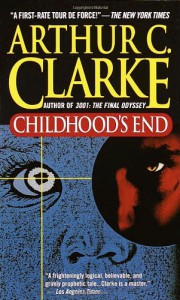Childhood's End
 A great piece of science speculation. The novel reads like a giant "What if we were contacted by alien life forms?" Clarke covers 150 years of hypothetical history and development, pursuing the logical consequences of such contact and the sharing of technology on society, culture, economy, science and religion from the perspective of the frontiers of science in the 1950s. Reading hards sci-fi from an actual physicist is really rewarding for the aspiring scientist. Included in detail are the hypothetical workings of fantastical devices within the laws of physics. Details make the novel plausible.
A great piece of science speculation. The novel reads like a giant "What if we were contacted by alien life forms?" Clarke covers 150 years of hypothetical history and development, pursuing the logical consequences of such contact and the sharing of technology on society, culture, economy, science and religion from the perspective of the frontiers of science in the 1950s. Reading hards sci-fi from an actual physicist is really rewarding for the aspiring scientist. Included in detail are the hypothetical workings of fantastical devices within the laws of physics. Details make the novel plausible. While there is a compelling mystery as to the motives of the Overlords and to what destiny they are guiding humanity, there seems to be only very minimalistic story-telling narrative. Most of it reads or feels like newsreel footage of the first 150 years after first contact with social commentary on the changes humanity experiences in the shadow of superior beings. That newsreel effect begins to blur toward the end of the narrative, and the admixture of mysticism and religiosity lost me a little. Clarke tries to unify religio-mystic elements within the penumbra of science simultaneously giving credence to faith-based records of miracles and religion in general while vindicating science and showing its eventual forward momentum will explain everything worth explaining. There's a conceit that there may be certain things that are beyond the workings of the human mind, but the superior intellect of the Overlords subsumes all phenomena within the realm of understanding to one degree or another.
I'm a sucker for science speculation like this from the 1950s. Most of the work of the ABC's (Asimov, Bradbury and Clarke) are unabashedly imaginative and innovative. Has science proved some of their work naive and down-right fanciful? Yes. But more often than not, the prescience of these three can still astonish the "sophisticated" minds of the early twenty-first century. Childhood's End would be a case in point.



